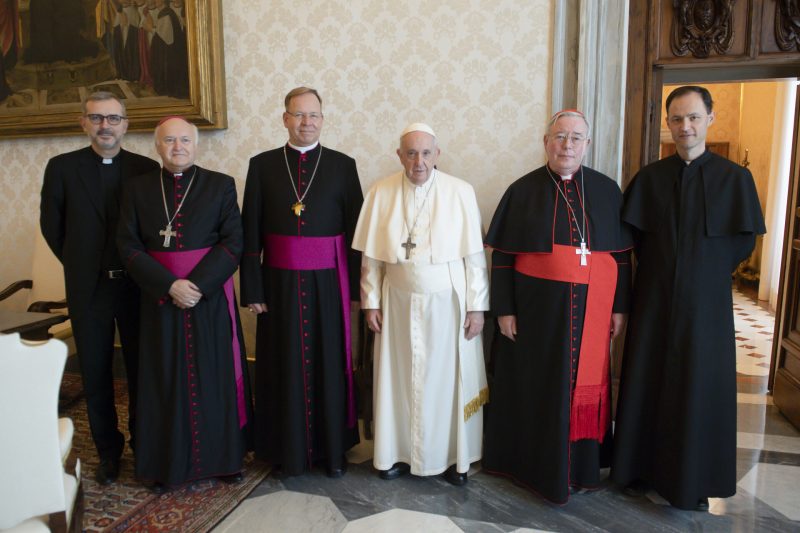On the tenth anniversary of his pontificate, European bishops join Pope Francis in calling for a just peace in Ukraine; they thank the Pope for his extensive “European magisterium,” retracing some of its fundamental stages, highlight the commitment to “help Europe rediscover the ever-young face of Jesus and his bride.”
These are the main contents of the letter of good wishes that the Presidency of the Council of Episcopal Conferences of Europe, on behalf of all the European bishops, sent Pope Francis for the tenth anniversary of his pontificate.
In the letter, the bishops underline the “European magisterium” of Pope Francis and recall his visits to the European Parliament and the Council of Europe in Strasbourg in 2014, the conferral of the Charlemagne Prize in 2016, and the meeting with the heads of State and government of the European Union on the 60th anniversary of the Treaty of Rome.
In the meeting for the 60th anniversary of the Treaty of Rome, Pope Francis underlined that “the founding fathers remind us that Europe is not a conglomeration of rules to obey, or a manual of protocols and procedures to follow. It is a way of life, a way of understanding man based on his transcendent and inalienable dignity, as something more than simply a sum of rights to defend or claims to advance.”
The European bishops also thank the Pope for his continued accompaniment in proclaiming Christ and “helping Europe rediscover the ever-young face of Jesus and his bride,” rediscovering the Christian values which are the basis of its European identity.
Finally, the CCEE Presidency notes that “since the invasion of Ukraine took place, he has never tired of asking for an end to the war and praying for the victims of this conflict.” For this reason, “together with our ecclesial communities, we want to join our voices with his and renew the appeal to those who have authority over nations to reach, as soon as possible, a just peace for the Ukrainian people.”
It is worth remembering that, following the awarding of the Charlemagne Prize, the European Commission decided to appoint a special envoy of the European Union for religious freedom. The first envoy of the European Union for religious freedom, Jan Figel, was also involved in the “securing” of Asia Bibi, the Pakistani woman who had been sentenced to death for blasphemy and later acquitted, who had to leave her country with his family to avoid being the target of violence or revenge by the population.
In recent years, in his “European magisterium,” the Pope has not failed to highlight some of the most significant challenges of the continent: from the demographic winter to European identity, which “has always been dynamic and multicultural,” from the right to live up to the right to welcome.
Of Pope Francis’ 40 apostolic journeys, 15 were dedicated to the European continent. During these trips, the Pope could visit 20 European countries, and in 12 of these, the population was not majority Catholic.
Therefore, Pope Francis’ choice of trips to Europe has concretely shown a preferential option for the “existential peripheries” of Catholics in Europe, as well as an explicit option in favor of ecumenical dialogue.
Today, while there is a war in the heart of Europe, it is necessary for Europe to look within itself and return to that spirituality and religiosity, which are the first seed of reconciliation between peoples. The European magisterium of Pope Francis encourages us to look at that spiritual backbone that has never failed, though it seems now hidden.
In recent years, Pope Francis has reiterated, in many nuances, that Christ truly is the hope of Europe and that today more than ever, it is necessary to return to God to look to the future of our continent.
Returning to God means returning to the vision of the human being and his integral development. This is also how ideological colonization is fought, repeatedly denounced by the Pope, which in our continent sometimes takes the form of hidden persecution against Christians, but against religion.
Attached the full text of the letter
Foto: © Vatican Media

